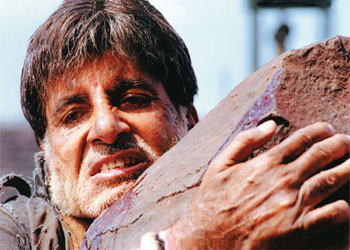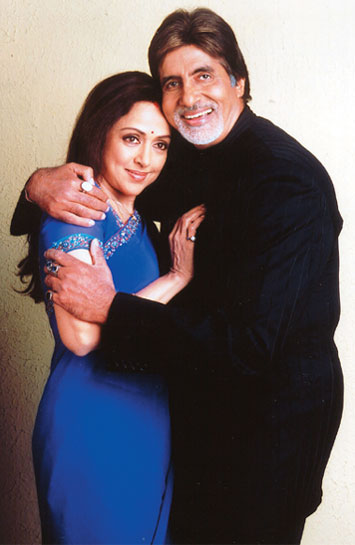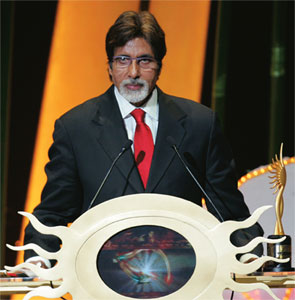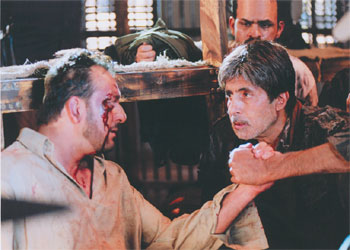| |
THE RENAISSANCE MAN
Having overcome age, financial disaster and career setbacks that threatened to swamp his existence just a few years ago,
Bollywood superstar Amitabh Bachchan has scripted one of the most intriguing comeback stories ever
By Dinesh Raheja in Mumbai

|
|
Spot the irony. Shah Rukh Khan and Hrithik Roshan have each had just one of their films-Main Hoon Na and Lakshya respectively-grace the marquee so far this year; Aamir and Salman have come up with zilch.
Busy thirty something's like Ajay Devgan and Akshaye Kumar have opened three films
each in theatres this year.
But Amitabh Bachchan, who at 61 is a good quarter-century older than most other heroes, already has five
releases to his credit. And the tall
actor is going to add another five films to his tally by
the end of the |
annum.
In a film industry as fascinated by number crunching and bean counting as Bollywood, Bachchan has worked a near-miracle. A
Bachchan-starrer was released on three of the four Fridays in June this year.
This propulsion in Amitabh Bachchan’s career is fuelled by film producers like Gaurang Doshi. Doshi, who has worked with
Bachchan recently in Aankhen and Deewar-Let’s Bring Our Heroes Home, says,"As long as Amitabh Bachchan works with me, I can
never think of making a film without him."
Today, Bachchan has emerged as the consummate Renaissance Man, having triumphantly overcome age, health problems,
financial quandaries and a series of debilitating setbacks that threatened to swamp his very existence just a few years ago.
Besides Bachchan’s obvious proficiency in his chosen art form, what is particularly fascinating about the star is
that his is one of the most intriguing comeback stories ever.
Nowadays, Bachchan’s hits may be less frequent than in the superstar’s heady heydays of the ’70s and ’80s, when the
actor had a string of superhits, (including four blockbusters: Don, Kasme Vaade, Trishul and Muqaddar Ka Sikandar
within a span of six months in 1978). Then, he was the definitive marquee mammoth. But even now, Bachchan’s
onscreen communion with the audience is unmistakable.
The paying public still reacts with hosannas when he puts across a performance of bruised elegance as in
Baghban, with hoots of disappointment when he takes on a less-than-exemplary role in Boom or with moans of frustration
if they feel the footage accorded to him is inadequate as in Lakshya.
Bachchan defies categorization. He still commands a remuneration that is roughly
on a par with the millions earned by the most popular heroes, even though some
of his film parts would earlier have been labeled "character roles." Simply put,
he doesn’t get to romance the
heroines.
From this vantage point, Bachchan’s jocularly expressed desire to pair opposite Aishwarya Rai
seems
|
|
 PAIRING UP: With Hema Malini in Baghban
PAIRING UP: With Hema Malini in Baghban
|
destined to remain unfulfilled. But at a
time when contemporaneous colleagues such as Rajesh Khanna,
Vinod Khanna and Jeetendra have all placidly passed on the baton to Generation X, Bachchan is that rare
actor grandfather who has remained relevant by making an ongoing effort to adapt to the current idiom of acting. For instance, in the recently released Lakshya, when Amitabh rendered a dialogue in unaccented Marathi with remarkable aplomb, the crowd broke into spontaneous applause.
Currently, Bachchan’s presence in endorsements alone
would generate an impression of omnipresence. Switch on
the TV and you can catch him hawking a product. The star is
regularly called in to hawk a gamut of products-from Asian
Paints to Parker pens to Maruti Versa to polio drops-which
he does with stoic but whole-hearted conviction. The
multiple zeroes on the paycheck go towards making him one
of the highest-earning entertainers in the country. Definitely,
as far as earning capacity of entertainers go, there is no
comparable person in the same age bracket.
Dapper in his white-speckled-with-grey French beard,
designer glares and his ubiquitous wristwatches, this man of
flint commands a seemingly unassailable position in the film
industry. Hotshot director du jour Karan Johar says, "My
mother always told me, 'Karan, he is one person I have
known since we were in college in Dehradun. I want you to
touch his feet, whenever you meet him. And that's what I have always done
since I was young."
With seniority adding a halo, in the industry itself, Bachchan is a dominant
cult figure with young actors like Hrithik, Vivek Oberoi and Fardeen Khan,
who are unabashed in their adulation for his performances. John Abraham,
who worked with Bachchan in Aetbaar, says, "When I got carried away in my
bid to be realistic and almost hit him during a fight sequence for the film,
director Vikram Bhatt cautioned me to be careful, saying, 'Amitabh is a
national treasure'."
|
My mother always told me, 'Karan, he is one person I have known since we were in college in Dehradun. I want you to
touch his feet, whenever you meet him. And that’s what I have always done since I was young.'
- Karan Johar -
|
Things weren’t going his way in the last decade. Infact, the late 1990s were nightmarish for Bachchan. It was almost as if Fate was demanding payback for all the privileges she had accorded him during his superstar days. After a five-year hiatus in the mid-90s, when Bachchan returned to the movies with the Mehul Kumar-directed action flick, Mrityudaata, the film suffered a quiet death. And it proved to be just the first in a long array of wrecks-in 1999 alone, Bachchan starred in four box office duds-Lal Badshah, Kohram, Hindustan Ki Kasam and Sooryavansham.
Worse, Bachchan’s ambitious venture into the corporate world, ABCL, came undone. Having ventured into several directions at the same time-from film production to hosting a beauty pageantthis mismanaged company was several millions in the red. Bachchan had simply taken on more than he could manage and along with wife Jaya, he was standing on the edge of a financial abyss.
It is said that in the world of showbiz, today’s peacock could well be tomorrow’s feather duster. There have been countless instances of stars who make one misstep and find themselves taking a vertiginous plummet into anonymity and degradation.
But when you consider how abjectly hopeless Bachchan’s situation seemed just four years ago, a poser springs to mind: How has he effected this 180-degree turn?
At the retirement-ready age of 58, however, Bachchan showed himself willing to roll up his shirtsleeves and go to work. The actor backed his undeniable talent with a nose-to-the-grindstone work ethic and a willingness to take calculated risks.
 At an awards show in Singapore in May
At an awards show in Singapore in May |
|
Quelling his ego, he went across to old friend Yash Chopra’s house and asked for a suitable role. At a time when it was considered infra dig for film stars to appear on TV, Bachchan agreed to helm a quiz show Kaun Banega Crorepati, the Indian version of Who Wants to be a Millionaire. Exhibiting great personal charm and an unsuspected genial side in his interactions with the participants, Bachchan was primarily responsible for the show’s recordshattering success. It enthused film stars like Govinda, Madhuri Dixit and Manisha Koirala to migrate to the small screen too, albeit with noticeably less heartening results.
To paraphrase a popular KBC catchphrase, for Bachchan’s career, it was a case of
segueing from 'Career lock
kiya jaaye?' to being thrown a lifeline.
|
Soon thereafter, Amitabh's
much-appreciated turn as the gimlet-eyed Narayan Shankar in the Yash
Chopra-produced Mohabbatein was like a seal of approval to his resurgent status.
The film industry welcomed him back. Though the industry is indubitably hard-nosed and professional, what helped Amitabh is that filmmakers appreciated the goodwill that he had developed over the long years of his professional life.
And one is not talking only of his fabled punctuality and professionalism. Amitabh is that rare star who has made
some two-dozen special appearances in films, showing himself constantly willing to help friends, colleagues and old
producers make their films more saleable for finicky distributors.
Significantly, Bachchan’s performances continue to have a contemporary edge and his subsequent appearance in commercially profitable films like Kabhie Khushi Kabhie Gham, Ek Rishta, Aankhen, Kaante and Baaghban have ensured that he remains topmost on most directors’ casting wish list. Inflated by the star’s triumph over his tribulations, Bachchan’s legend has assumed immense proportions in his own lifetime.
Bachchan’s ability to boomerang back into the winner’s circle has won him admiration. But the taciturn star has done the same once before too. When Bachchan began his career in films, he was written off even before the release of his first film, Saat Hindustani. The late 1960s was the era of Shammi Kapoor-Rajesh Khanna musicals and the lanky newcomer with the
unfashionable hairstyle got short shrift from most of the producers he met for work. His illustrious surname (father Harisvanshrai Bachchan was a renowned Hindi poet; mother Teji Bachchan was a close associate of the
Nehru-Gandhi family) got him an audience but few offers.
Bachchan says he had left his job as an executive in a Kolkata firm and
come to Mumbai with his driver’s license. The license was his safety net-if
pushed into a corner, he could always work as a taxi driver. But in retrospect,
that seems like an example of his characteristic wry humour. Music director
Anandji, who has been on countless shows across the world with Amitabh,
says the budding actor was nicknamed Tiger by his friends in those early days.
And he lived up to his 'Tiger' tag. After a long initial line-up of flops and
rejections (he was thrown out of a film named Duniya Kya Jaane), Bachchan
picked up the gauntlet-he adapted a designed-by-Hakeem hairstyle, chose a
fashion house called Kachchins to design his wardrobe and sacrificed the
onscreen softness (he was bespectacled in Sanjog, mute in Reshma Aur
Shera) of his earlier films for a belligerent new attitude.
His star-girlfriend Jaya Bhaduri, and luck, sided with him. Attracted by the
intensity of his portrayals even in failed films, scriptwriters Salim Javed and
director Prakash Mehra cast Amitabh as a committed but anguished
policeman in Zanjeer. Amitabh’s well calibrated performance as the
anguished man of the law earned him fulsome accolades and the film's box
office success saw the genesis of a new star. The film had concocted a
totally unexpected alchemy and turned the tall, lanky newcomer into a matinee
superhero.
Manoj Bajpai pinpoints Zanjeer as the birthplace of the Amitabh
phenomenon. "I saw the film during my childhood," says the actor, "Amitabh’s
performance left a tremendous impression on me. And do you know, because
I want to hold onto that feeling, I haven’t seen Zanjeer ever again."
While Zanjeer was hugely influential in moulding Amitabh’s screen persona, and
consequently that of an entire generation of screen heroes, into the angry young
man slot,
Manmohan Desai and Prakash Mehra went one step further and
presented the actor |
|
 ROLE MODEL: With Sanjay Dutt in Deewar
ROLE MODEL: With Sanjay Dutt in Deewar
|
as a complete entertainer in light-hearted, crowd-pleasing films like Amar Akbar
Anthony and Namak Halal.
The true dimensions of the Amitabh cult became evident when the actor
suffered an on-the-sets accident on the sets of Desai’s Coolie in Bangalore, and
it proved to be near fatal. It seemed as though the entire country had stopped
in its tracks in 1982, but Amitabh, then 40, pulled off a recovery.
An ill-advised side-step into politics in the mid-80s soon led to Bachchan’s
return to films. But the strain of a wearying disease (myasthenia gravis) and
two decades of punishing work schedules saw Bachchan take an
unprecedented step. Despite box office successes like Aaj Ka Arjun (’90) and
Hum (’91), he chose to voluntarily take a hiatus after Khuda Gawah (’92). The
break stretched for five years and when he returned it was in his corporate
avatar as head of ABCL and he signed himself a check of Rs 30 million for
Mrityudaata. Bachchan’s failure to quickly secure a successful comeback for
himself has, arguably, added fortuitous aspects to his screen persona. Losing
his one-man-industry status definitely freed Bachchan from the responsibility
of delivering a super-hit each time and gave him the space to experiment with
his craft. As long as Bachchan was part of the rat race, he circumscribed his
creativity by doing largely conventional roles, although he did compensate by
introducing inflexions to the most mundane characters. What is welcome is
his recent willingness to shun playing romantic characters as in Lal Badshah
and Sooryavansham and reinvent himself as a patriarch in films like
Mohabbatein, Ek Rishta, Kabhie Khushi Kabhie Gham and Baaghban or the
troubled older man in films like Aankhen, Khakhi, Dev.
Make no mistake — he is still nifty even if he has crossed 60. "We did Aks
together and I felt so proud just to be sharing the frame with him," says Manoj
Bajpai. "He constantly amazes me with his dedication. He does 15 rehearsals
before a take. He works on every nuance. He makes all kinds of roles seem
convincing. Can any actor manage that?" Few actors can also match
Bachchan’s self-possession, which people have accepted as a given.
Bachchan’s supporters proudly point to his suave exterior and articulate
expressions on several public occasions while skeptics remark that this outer
shell keeps the inner Bachchan forever under wraps. Certainly, however,
Bachchan has been unerringly civilized in public and has also exhibited an
old-fashioned sense of honor in his willingness to plough back part of his
income and pay back his many loans.
While the audience does respond to a star’s extraordinary off-screen
personality, they still primarily relate to him as an actor. And that relationship
remains Bachchan’s main claim to fame.
His recent forays into cinematic experimentation have yielded perceptive
performances resulting in most sought-after directors automatically
gravitating towards the actor. Post Devdas, Sanjay Bhansali has cast Bachchan
in his forthcoming film, Black. Gadar director Anil Sharma is making Ab
Tumhare Hawale Watan Saathiyon with Bachchan headlining the cast. Vinod
Chopra wants him for his next film and so does Rajkumar Santoshi. Mahesh
Manjrekar is all set to direct him in Viruddh co-starring Sharmila Tagore,
Sanjay Dutt and John Abraham. And Ram Gopal Verma is trying to see if he can
be the first filmmaker to showcase Amitabh alongside his son Abhishek.
Despite the body of work already accomplished, the future still holds
promise. Bachchan’s career remains a work in progress. At 61, the evergreen
superstar is ready for his next close-up.
|
|